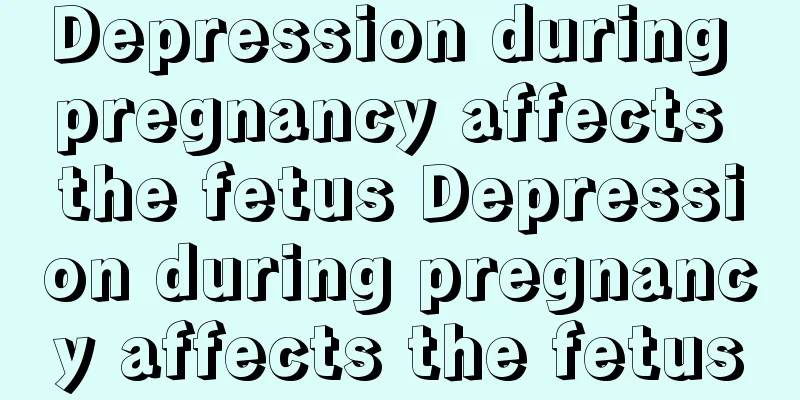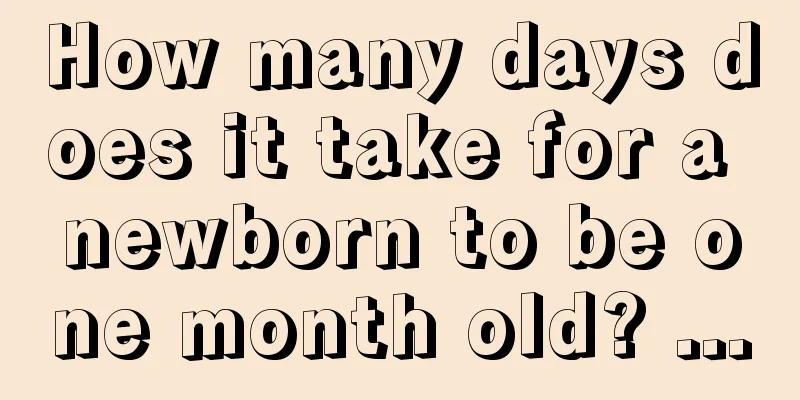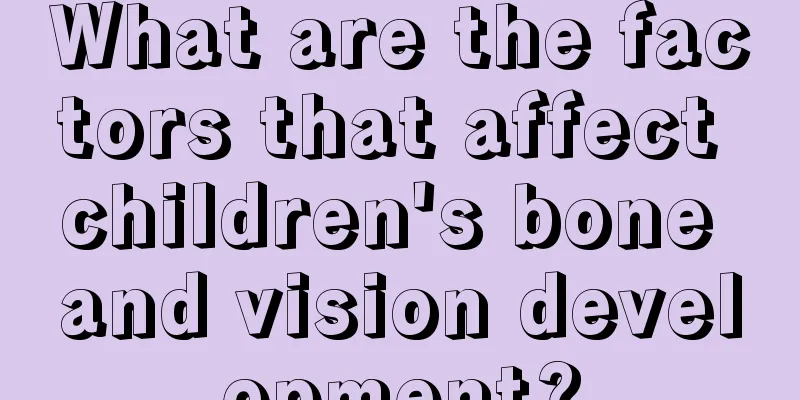Depression during pregnancy affects the fetus Depression during pregnancy affects the fetus

|
Depression during pregnancy is a very dangerous thing, which is very harmful to both the pregnant woman and the baby. Therefore, the mother needs to pay attention to her emotions during pregnancy. So let's take a look at the impact of depression during pregnancy on the fetus. What are the harms of depression during pregnancy to the fetus? Effects of depression during pregnancy on the fetusDepression during pregnancy will have an impact on the health of the fetus, but if it is mild depression, the problem is not big. Try to ensure that you do not suppress your emotions for a long time. Some studies have shown that pregnant women have large mood swings in the early stages of pregnancy, which may cause cleft lip and palate in the fetus. If the mental state changes drastically during pregnancy, such as being intimidated, frightened, or overly sad, it may cause a disorder in the relationship between the cerebral cortex and internal organs, cause circulatory system dysfunction, cause placental abruption, and fetal death. Moreover, when the fetus is emotionally disturbed, the fetal movement will be much faster than usual. If the fetus is disturbed for a long time, it will be born with a low birth weight, resulting in fetal growth restriction. If the depression lasts for a long time, the baby is also prone to dysfunction after birth, especially digestive dysfunction. Depression during pregnancy can also cause the nervous system to secrete different harmful substances or hormones, which enter the fetus through the blood and affect the fetus's physical and mental health. The harm of depression during pregnancy to the fetusMood swings in pregnant women can have a great impact on the fetus. According to clinical studies, excessive anxiety in pregnant women during the 4th to 10th week of pregnancy may cause fetal lip deformity and cleft palate. Sudden changes in the mental state of pregnant women, such as excessive mental tension caused by shock, fear, sadness or other reasons, can cause imbalance between the cerebral cortex and internal organs, cause circulatory system dysfunction, lead to early placental detachment, and even cause fetal death. In addition, when the mood is uneasy, the number of fetal movements will be three times more than usual, or even up to ten times the normal number. If the fetus is long-term uneasy and consumes too much physical energy, it will often be about one kilogram lighter than the average baby at birth. If the pregnant woman cannot calm down within three weeks after a quarrel with someone, the number of fetal movements will double. If the mood is suppressed for a long time during pregnancy, the baby will often have physical dysfunction after birth, especially the digestive system function is particularly prone to disorder. Moreover, the mother's emotional ups and downs will stimulate the nervous system to secrete different hormones, which enter the fetus through the blood, thus affecting the baby's physical and mental health. Can depression during pregnancy lead to postpartum depression?Depression during pregnancy generally increases the risk of postpartum depression. Therefore, if a pregnant mother suspects that she is always feeling down but can't find the reason, it is best to consult a doctor. Some antidepressant drugs can be taken during pregnancy. Experts also suggest that family or friends can help pregnant mothers improve their sleep, make hearty and delicious meals together, or go for a walk together, which can help pregnant mothers with less severe depression. Can depression during pregnancy be passed on to the baby?If the mother has depression, there may be a certain chance of inheritance. If the mother has a clear family history of depression (there are patients with depression in several generations before the mother), then the chance of inheritance will be greater. Studies have reported that if one parent suffers from affective disorders (including depression), the risk of their children suffering from the same disease is about 20%. If both parents suffer from affective disorders, the risk of their children suffering from the same disease can be as high as about 50%, or even more than 70%. If the mother has no family history of depression and other mental disorders, and has no obvious personality defects, and the depression occurs relatively late, and it is clearly caused by mental stimulation, then the chance of inheritance is very low. |
Recommend
2017 Science Lesson Plan Kindergarten 2017 Kindergarten Science Experiment
What are some convenient and easy-to-operate scie...
Is toothpaste acidic or alkaline? Is toothpaste with fluoride or without fluoride better?
We all need to brush our teeth every day, so we n...
Does the sound of firecrackers affect the hearing of newborns?
Every New Year, every household will set off fire...
What kind of heating is good for confinement in winter?
Many people have confinement after childbirth in ...
What are the benefits of natural childbirth for mothers?
There are many benefits of natural childbirth, su...
What are the symptoms of calcium deficiency in infants and young children? 4 major symptoms to pay attention to
The growth and development of children is what ev...
How to breathe during childbirth? How to push correctly during childbirth?
Childbirth is painful and joyful for all women. H...
How do parents teach their babies safety knowledge in kindergarten?
When a child starts going to school, it is the be...
Are electric blankets harmful to pregnant women? Pregnant women should not use electric blankets
In winter, electric blankets become a very popula...
Bedtime story for children in the Year of the Monkey: Monkeys also have dreams
Everyone has his or her ideals, even babies have ...
How to treat bronchitis caused by cold in children
Young children are very susceptible to colds, esp...
3 things you shouldn't do in front of your children
First, don’t quarrel in front of your children, a...
Can pregnant women eat mangoes? What are the advantages and disadvantages of eating mangoes for pregnant women?
Mango is a fruit that everyone is familiar with. ...
What should I pay attention to in my ADHD diet? Massage methods for children with ADHD
In addition to parents' emotional counseling,...
Can pregnant women eat oatmeal to supplement dietary fiber?
Pregnant women can eat oatmeal. When choosing oat...









